#vieux texte
Text
Borborygmes célestes

Le ciel surplombant ma pauvre tête était couleur de cendre,
Emplie de la colère divine tournée contre ceux qui se plaisaient à prendre le pouvoir des Dieux
Un nuage de feu, s'embrasant de Haine, rugit de toute sa voix grave,
Imposant sa puissance naturelle.
Un grondement s'étendant, tel le galop d'une cavalerie furieuse, fit trembler la Terre.
"Ecoutez donc ! Ecoutez la colère des Cieux !
Et les pleurs des êtres ailés qui les peuplent...
Ecoutez leur Chant Glorieux, un hymne à la Force.
Voyez les éclairs déstructeurs,
Voyez les Foudres brûlantes, embrasser l'étendu céleste, déchirer les Cieux.
Voyez ce qui s'abbat sur nos têtes !"
Je sentais vibrer en ma poitrine les rugissements de ce qui fut quelques instants plus tôt une étendu-
-calme d'encre bleu,
Une lumière évanescente m'aveuglait soudainement, et en un bruit de coup de feu, un arbre abandonné-
-de toute vie tomba sous l'écrasante foudre blanche.
Peu à peu, la fureur du ciel s'apaisa, laissant à ceux de la terre un calme absolut. Et les tremblements de la peur,
du choc, l'impuissance considérée.
(...)
Le ciel plut, se purgeant de sa peine en de fines larmes grises.
Texte © Ayanna

#poème#poème court#textes en poème#poème français#poème en prose#prose#tempête#ciel#éclair#orage#orages#foudre#poésie#french poetry#texte#lyrique#vieux texte#nuages#borborygmes célestes#courte poésie#texte inachevé#route#écriture#écrire#auteure#femme écrivain#écrivaine#lumière#céleste#anges
5 notes
·
View notes
Text

[bdubs voice] saison
#extremely deep cut throwback to etho lp screenshot top text YOU HYPOCRITE READER#bottom text MON SEMBLABLE - MON FRERE#realisa onum babey#clover au#'why did you use the genius annotations for a baudelaire poem'#obvs it's not just the m. wicked and sad ref it's the fact that i'm being haunted by god damn 1988 mylene farmer intro ambiance#meurs vieux lâche ! il est trop tard !
9 notes
·
View notes
Text
Nostalgie
Nouvelle du : 11/10/22
Défi : Ecrire une nouvelle à partir d'une image aléatoire.
Jean marchait dans le parc avec sa femme. Comme d’habitude, il suivait les chemins de gravier jusqu’aux sièges convoités. Il espérait profondément que leur banc favori fût libre. Il marchait, sous le ciel sombre de l’automne…
Finalement, il arriva au lieu voulut. C’était un endroit calme par le passé. Trois bancs alignés sur la terre noire autour du gazon, donnaient vue sur le chemin de gravier ainsi que sur le petit lac du parc. Ils étaient faits de bois qui avait moisi avec le temps, mais les bancs restaient toujours aussi confortables pour Jean et sa femme.
Il se dirigea vers celui de droite où reposait une feuille morte, jaune et bientôt, marron… Il s’assit sur les planches de bois et regarda sa femme en tapotant le banc à côté de lui. Sa femme prit place, laissant la feuille entre eux, puis, ils purent enfin couper le silence.
« Tu te souviens, demanda-t-il d’une voix fatiguée, de la première fois où nous étions venus sur ce banc ?
— Oui, Jean… Je m’en souviens. C’était un moment agréable. »
Ils restaient les yeux figés dans l’horizon du lac.
Ce souvenir, Jean se le remémorait à chaque fois qu’il s’asseyait sur ce banc et, comme d’habitude, il ne manquait pas de le partager une fois de plus avec elle. Il le faisait à chacune de leurs sorties quotidiennes.
« C’était aussi sur ce banc que tu m’avais embrassée pour la première fois.
— Oui… Nous étions si beaux à l’époque. »
Mais les pensées de Jean s’assombrissaient avec le temps. Le regard sur le passé avançait toujours jusqu’au présent. Après un court moment d’absence, il reprit plus tristement :
« Je doute que les jeunes d’aujourd’hui connaissent un jour, le bonheur d’embrasser une belle femme sur un banc solitaire…
— Je ne sais pas. Peut-être certains le font-ils encore ? »
Elle ne semblait pas convaincue par ce qu’elle disait. Comme lui, elle était nostalgique d’un temps plus romantique, plus courtois et plus valeureux. Un temps où la complémentarité de l’homme et de la femme était mise davantage en avant que leur égalité. Un temps où l’on ne simulait pas, mais où l’on était, et où l’on était heureux…
Des pigeons vinrent se mêler à eux. Ils balançaient leur tête d’avant en arrière, avançant avec confiance devant le banc. La femme de Jean avait autrefois pour habitude de leur jeter un morceau de pain, mais elle ne le faisait plus. Néanmoins, les pigeons venaient toujours auprès d’eux.
« Tu penses qu’on nous oubliera ? » s’inquiéta-t-elle.
Jean tourna son visage vers elle. Il la trouvait encore sublime malgré l’âge. En la regardant, son cœur battait aux souvenirs de mille instants.
« Je pense que, comme nous l’avons fait pour nos anciens, on oubliera notre façon de vivre. Rien ne persistera. Les gens oublieront nos moments de joie au titre que notre vie leur paraitra plus difficile que la leur. Ils oublieront qu’en réalité, nous les plaignons… Car cela leur serait insupportable de penser qu’ils vivent dans un monde malheureux. »
Le froid s’étalait sur ses mains. Il les frotta entre elles pour se réchauffer partiellement, mais il savait que l’automne allait toucher à sa fin, pour laisser place à un terrible hiver. Dans le regret, il baissa son regard vers la terre mouillée sous ses pieds.
« Si seulement nous avions écouté les joies passées, nous aussi, au lieu de nous croire plus intelligents… »
Sa femme laissa partir un souffle de désespoir. Elle aussi était plongée dans la mélancolie. Elle aurait aimé pouvoir le prendre dans ses bras pour réconforter ses tourments. Une larme glissa sur le visage du vieil homme mais il n’y fit pas attention. Celle-ci allait geler, comme tout le reste.
« Te souviens-tu de notre premier baiser ? » lui susurra sa femme.
Il se redressa lentement, puis il tourna son regard vers le sien. Elle se rapprocha tendrement de lui, poussant la feuille jaune du passage, puis, il lui donna un dernier baiser qui ne sut apaiser sa tristesse… Il se leva du banc, et regarda une dernière fois sa femme.
« Tu me manque terriblement, Martine… »
Seul au milieu de ce parc d’automne, Jean reprit sa route, le cœur déchiré.
#nouvelle#nouvelles#texte#écriture#écrire#écrit#histoire#court#nostalgie#littérature#amour#mélancolie#poésie#vieux#vieillesse
1 note
·
View note
Text
i have brainrot for this game so heres cocktail recipes for all Baldurs Gate 3 companions




text version of images below the cut!!
Lae'zel
1oz Absinthe
2oz Lime juice
Half cup ice
Combine ingredients in a chilled glass.
Stir.
Shadowheart
2oz bourbon
1 egg white
1/2oz simple syrup
1oz lemon juice
1/2oz red wine
1 cup ice
Combine bourbon, lemon juice, simple syrup, and egg white in shaker with ice.
Shake until chilled, then strain over fresh ice into a chilled glass.
Slowly pour red wine over the back of a spoon so that the wine floats on top.
Karlach
2oz rum Fire White Overproof
2oz monster energy drink
1/2oz simple syrup
1 cup crushed ice.
4 pitted cherries
1 lime wedge
Mix lime wedge, cherries, and syrup together until cherries are broken up.
Add those to a shaker. Add energy drink and rum.
Shake until chilled, then strain over ice into cup.
Gale
Red wine
Tears
Astarion
1oz sweet vermouth
1oz cherry liqueur
1oz gin
1oz blood orange juice
2 maraschino cherries
Combine sweet vermouth, cherry liqueur, gin, and blood orange juice in shaker with ice.
Shake about 15 seconds, until 'frothy'.
Pour into glass and garnish with 2 maraschino cherries impaled on toothpick.
Wyll
2oz Saint Brendan's irish cream liqueur
1oz hazelnut rum
Fill remainder with root beer soda
Chill ingredients beforehand.
Pour ingredients into a chilled mug.
Stir.
Halsin
3oz dark rum
1oz simple syrup
3/4oz lime juice
1 teaspoon grenadine
3 dashes Angostura bitters
1 splash club soda, chilled
Mint sprig
Add the dark rum, simple syrup, lime juice, grenadine and bitters into a shaker with ice, and shake until well-chilled.
Strain over crushed ice into a glass, and top with a splash of club soda.
Garnish with a mint sprig.
Minthara
3/4 ounce Vieux Pontarlier absinthe
1/2 ounce Branca Menta
1/2 ounce coffee liqueur
1 1/2 ounces espresso
1 teaspoon demerara sugar
1 dash Angostura bitters
1 pinch coarse sea salt
1 orange twist
Add the absinthe, Branca Menta, coffee liqueur, espresso, demerara sugar, Angostura bitters, and sea salt into a shaker with ice and shake until well-chilled.
Double-strain into a glass.
Express the oil from an orange twist over the glass and discard.
452 notes
·
View notes
Text

---


Native American tribes from Michigan, Wisconsin and Ontario have come together to call for an end to the Line 5 pipeline.
The Enbridge Line 5 crude oil pipeline, first constructed in 1953, stretches from Wisconsin through 645 miles of Michigan and ends in Sarnia, Ontario. Part of the pipeline travels underwater through the Straits of Mackinac.
In recent years, the pipeline's continued operation has become a source of controversy. Many tribal nations and communities claim that the pipeline goes through their traditional territories. The Straits area in particular is considered a place of significant cultural and historical importance to many native groups, including the Anishinaabe. According to tribal leaders, the pipeline poses a major and direct threat to the ecosystems along its path.
“The Straits of Mackinac are [...] sacred from both a cultural and historical perspective in the formation of the Anishinaabe people,” said Austin Lowes, chairperson of the Sault Ste. Marie Tribe of Chippewa Indians, in a statement. “Protecting the Straits is also a matter of the utmost environmental and economic importance — both to our people and the state of Michigan.”
Tribal leaders and other environmental groups have publicly opposed the pipeline for many years and have called for the pipeline to be shut down.
Supporters of the pipeline point out that it transports 540,000 barrels of light crude oil and natural gas liquids through Line 5 on a daily basis. [...]
In an effort to address safety concerns, Enbridge has proposed an underwater tunnel to house the portion of Line 5 that runs under the Straits of Mackinac. [...] Critics of the tunnel project say no oil should be transported through the Straits at all, as a spill could have a devastating impact on more than 700 miles of Great Lakes shoreline. [...]
Previous attempts to shut down the pipeline have been stopped through various means, mostly the 1977 Transit Pipeline Treaty between Canada and the United States.
The latest attempt saw 51 tribal organizations from Wisconsin, Michigan and Ontario submit a report to the United Nations Human Rights Council. This report, dated April 4, claims that the Government of Canada is violating the human rights of Indigenous peoples through its continuous support for Line 5.
The report was submitted to be considered during Canada's upcoming Universal Periodic Review, conducted by the United Nations. As a United Nations member state, Canada is required to be evaluated for its human rights record on a regular basis.
Canada's Universal Periodic Review will take place this year on Nov. 6-17.
The 51 different tribal organizations that signed the report include: The Anishinabek Nation, which represents 39 First Nations throughout the province of Ontario, Sault Ste. Marie Tribe of Chippewa Indians, Bad River Band of the Lake Superior Tribe of Chippewa Indians, Bay Mills Indian Community, Grand Traverse Band of Ottawa & Chippewa Indians, Hannahville Indian Community, Lac Vieux Desert Band of Lake Superior Chippewa Indians, Little River Band of Ottawa Indians, Little Traverse Bay Bands of Odawa Indians, Match-e-be-nash-she-wish Band of Pottawatomi Indians, Nottawaseppi Huron Band of Potawatomi, Saginaw Chippewa Indian Tribe and Red Cliff Band of Lake Superior Chippewa.
---
Headline and text by: Brendan Wiesner. “Michigan, Wisconsin and Canadian tribes come together to fight Line 5.” Yahoo! News. 8 April 2023. Article originally appeared on The Sault News with the title “Great Lakes tribes send report to United Nations to fight Line 5.” [Some paragraph breaks and contractions added by me.]
Context:
Line 3 brings oil from Alberta to Lake Superior. Then, Line 5 brings the fossil fuel from the Duluth area to the Detroit/Windsor area in Ontario.


693 notes
·
View notes
Text
Il y a deux jours je suis allez faire un tour sur prd. Ça faisait longtemps ! J'étais curieuse de voir les nouveaux forums qui s'étaient montés mais aussi voir quels anciens tiennent le choc après un an ou deux voir plus.
Savez-vous ce que j'ai eu à la fin de ma session de farfouillage ? Une migraine ! On s'en fou non me direz-vous ? Et bien non !
Ma migraine a été provoquée tout simplement par un manque d'accessibilité numérique sur les différents rpg. Je peux comprendre que de vieux forums aient du mal à changer leur charte graphique et encore pas vraiment justifiable ... Mais les nouveaux forums qui se montent ...
Je rêve d'un monde où la police ne serait pas en dessous de 15px, ou les polices de textes seraient lisibles et non justes jolies, que les textes respirent avec des interlignes corrects et que chacun vérifie que les couleurs mises en place respectent les normes d'accessibilité ! Pitié arrêtez avec votre jaune sur du rouge où on doit plisser des yeux pour lire et bannissez aussi votre blanc et noir pur !
Il y a un tas de ressources bien faites qui circulent sur le sujet, prenez la peine de les lire, pour le bien de tous ! Et quand je vois que des personnes qui sont au courant de ces ressources, font des forums sans appliquer les recommandations/conseils ça m'exaspère au plus haut point.
L'accessibilité numérique ce n'est pas seulement pour les personnes avec des difficultés, si ça fait du bien à une catégorie de personne ça fait du bien à tous !
Dans mon job je milite pour ça au quotidien et je me demande si je ne vais pas faire de mon Tumblr mon cheval de bataille pour les forums !
Il est temps que ça change. On a bien réussi à changer d'autres pratiques pour rendre les rpg plus safe et bien ça passe aussi par offrir un design agréable à sa communauté, c'est aussi prendre soin de ses membres en travaillant son accessibilité numérique !
Un long texte mais j'avais besoin de déverser sur Tumblr ... ✨
#accessibility#forum rpg#rpg francophone#codage#forum#design#malauxyeux#accessibilitenumerique#projet rpg
107 notes
·
View notes
Text
Tips pour RP avec des personnages ayant des troubles dys.
Je parle surtout avec mon vécu et les difficultés que je retrouve au quotidien.
(Mon texte ne sera pas corrigé via un correcteur en ligne. Risque de faute.)
• Éviter un maximum d'utiliser des polices avec des empâtement.
C'est aussi agréable pour nous que lire un pavé barré. (Lexend de Google font... Just perfect).
• Prenez le temps de séparer les lignes de dialogue du reste du texte.
Changer de couleur ne suffit vraiment pas. Sautez au moins une lignes avant et après. Surtout si l'espacement des lignes est petite.
• l'écriture inclusive c'est ok, mais pas pour tout. Le mélange de mots (celleux, createurices etc...) c'est juste une difficulté en plus pour nous.
Comme certains point médian ! Au mieux, demandez a la personne avec qui vous jouez si iel préfère le •, le . ou encore le bon vieux - (mon pref ! Celui qui le convient me mieux). Et le TOP DU TOP ! Utilisez des mots neutres, tout simplement. Genre "Les hommes et les femmes" dire "les personnes" aux lieux de celleux. (C'est mieux si l'écriture inclusive était vraiment inclusive pour un max de gens).
• Essayez d'être assez bref.
Genre ça sert vraiment a rien de broder le texte en rajoutant des mots inutiles pour dire que Eugène mange une tranche de pain de mie. Joliment le décrire, oui. En faire une tonne, non. Pas besoin de remonter jusqu'à la pouce du blé.
• Si on répond a côté de la plaque, nous le dire avec bienveillance.
Il arrive (souvent) qu'on lisent mal une phrase, ce qui peut changer le sens de la réponse qu'on nous a envoyé. Ce n'est pas un manque d'attention mais juste que parfois, certains mots se changent en d'autre mots, ce qui est problématique pour la conpréhension su texte.
• Écrire et surtout lire nous prend plus de temps et plus d'énergie.
Nous pressez ne sert a rien a part nous mettre mal. Quand le texte devant vos yeux, même avec la plus grande concentration au monde, est illisible (fatigue, stresse...). Bah on ne peut rien y faire.
• Nous rattraper sur nos fautes sans notre accord peut être... Extrêmement vexant et baisser notres estimes de nous.
On sait qu'on fait des fautes, et même avec une super explication on l'a refera au premier coup de fatigue. Écrire est surtout un plaisir, on n'as pas forcément envie d'avoir un court de français, même si de base le geste était bienveillant.
• Surtout... SURTOUT laissez nous une chance.
Personnellement j'ai souvent ressenti de la honte a cause de ça. Je fais des fautes, je passe mes RP au correcteur orthographique, mais certaines fautes restes.
Bien-sûr, chaque dys est unique. Certaines choses dites ici ne sont pas valable pour tout le monde. C'est surtout mon vécu et ce que j'ai pu entendre en parlant avec d'autre dys rpgiste (trop rare malheureusement, souvent pas honte).
C'est pour ça que le mieux à faire, c'est d'en parler en amont. A vous, personnes dys, de prévenir en cas de problème. Et a vous, les autres, d'être cool pour que tout le monde puisse partager un passe temps/passion dans la joie et la bonne humeur.
Les dys (et autres), n'ayez pas honte. Ce n'est pas parce que votre écriture n'est pas parfaite que vous écrivez mal. Nous ne sommes pas bête, pas fainéants, et non, nos troubles dys ne sont pas une "simple excuse pour mal écrire" mais bien un handicap.
N'hésitez pas a rebloguer si vous voulez rajouter quelque chose (surtout des petits conseils) ou a tout simplement le dire en commentaire.
Et soyez bienveillant, il y a déjà trop de colère en ce moment.
La bise ! ♥
#dyslexic#dys en tout genre#dysorthographic#forum rpg#rpg#rpg francophone#Bisounours time#jé fé dé fote mé c pa grav
59 notes
·
View notes
Text

Saint Louis of the Vieux Carré —an LDPDL fan event
A month-long creative challenge to celebrate Louis's 146th birthday, this October 4th. Starting October 1st and through the whole month, we'll be celebrating AMC IWTV's Louis de Pointe du Lac, who turns 146 this year!
Starting October 1st, you’ll be able to see the fan creations shared as part of the event in the tag, here »
31 prompts
day 1. humanity | human life
day 2. crossover
day 3. confession | penance
day 4. through the decades
day 5. hunger | feeding habits
day 6. canon divergence
day 7. memory | keepsake
day 8. fashion
day 9. epistolary | handwritten
day 10. missing scene
day 11. literature | intertext
day 12. intoxication
day 13. floral | the last bouquet
day 14. dubai
day 15. love | lust
day 16. parenthood
day 17. canvas | visual arts
day 18. storytelling
day 19. marriage | relationships
day 20. new orleans
day 21. performance | gender
day 22. family
day 23. fairy tales | monsters
day 24. photography
day 25. faith | purpose
day 26. alternative universe
day 27. grief | ghosts
day 28. paris
day 29. childhood | innocence
day 30. music
day 31. halloween | haunted houses
How does this event work?
Every day of the month has an assigned prompt. The real challenge is to try and create something new for each day and each prompt.
But, of course, that is an ambitious goal! There are easier options.
If you...
create only one thing, or two, or three
only create something for two or three of these prompts
create something for a prompt but post it a few days later
don’t follow the prompts at all
...you’re still participating —as long as your creation is about Louis de Pointe du Lac, as portrayed by Jacob Anderson.
And Louis's character exists in relation with others, of course! So your contribution could be a portrait of the entire du Lac family, a playlist about one of his romantic relationships, a comic about his relationship with Claudia from her point of view, etc.
If Louis is at the heart of your creation, then your piece is in the spirit of this event.
This challenge isn’t limited to fanfiction or fanart!
Your contributions as a fan don’t have to be restricted to the most usual mediums. Beyond fanfic and fanart, some things that you may decide to create include: fanmixes, moodboards, gifsets, photomanips and graphics; fanedits and AMVs; meta and analysis in written, audio or video form; poetry, music, a blog post about your headcanons, your meta, or your favorite fanworks; and anything else you can think of.
Your creations can be related to your own or others’ existing work as well —if, for example, you want to use one of the prompts to add to an existing fanfiction series, or as inspiration for fanart of your favorite fic, that’s totally within the scope of this challenge!
You can start working on your creations for this challenge with as much (or as little) anticipation as you like, but remember to hold off from sharing them until the event starts. And, if you are taking inspiration from a prompt, we encourage you to share your work on that day.
Reblog or repost this text and graphic to spread the love; and don't forget to tag your posts with #IWTVfanevents or tag @iwtvfanevents so we can share them on the blog, and add them to the collection on AO3: Happy birthday LDPDL!
#louis de pointe du lac#interview with the vampire#amc interview with the vampire#AMC IWTV#IWTV AMC#IWTV#st. louis of the vieux carré#IWTVfanevents
122 notes
·
View notes
Note
hebert had a wife and daughter?
Indeed he had!
Hébert’s wife’s name was Marie Marguerite Françoise Goupil. I haven’t found better information regarding her birth more than that it happened in Paris in ”the first days of 1756” (she was in other words one year older than her future husband). I also haven’t found out which of her three names was her first name, though all texts I’ve checked settle on Françoise, so I’m also going to call her that.
Françoise, according to Paris révolutionnaire: vieilles maisons, Vieux papiers (1903) was the only child of Jacques Goupil and his second wife Marie-Louise Morel. The former had been the owner of a not very successful lingerie business which his wife then took over after his death. When Marie-Louise died as well, on July 16 1781, she had for a while lived with and worked as a nurse for the abbot Vaudair, who it is possible her daughter then turned to when she a while later started working for religion. Françoise became a nun of the Couvent des Filles de la Conception on rue Saint-Honoré, the same convent where Élisabeth Duplay claimed she and her three sisters took their first communion.
In June 1790, municipal commissioners presented themselves at the convent to hear its inhabitants’ declaration on whether they would stay there or leave. Out of the 24 nuns, only Françoise responded that ”she could not make up her mind at the moment,” the other 23 declaring that ”faithful to their wishes, they wanted to live and die in their state as nuns.” A year later, July 1 1791, Françoise’s name no longer featured among the convent’s inhabitants, meaning she had left it, be that out of free will or her sisters kicking her out for what she had said the previous year.
Hébert’s fellow journalist Louis Marie Prudhomme claimed in his l’Histoire générale et impartiale des erreurs, des fautes et des crimes commis pendant la Révolution (1797) that it was while at La Société Fraternelle des Patriotes de l'un et l'autre sexe Françoise for the first time met her future husband. Their wedding was held in the parish of Saint-Gervais on February 7 1792 (see the image below). After the marriage, the couple settled on Rue Saint-Antoine.
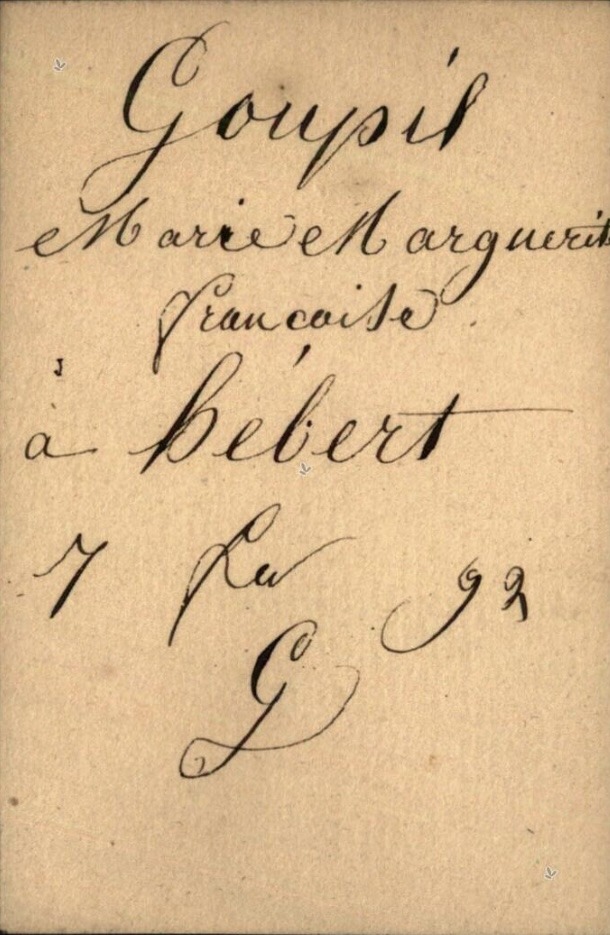
According to the same Prudhomme, Hébert was however not heads over heels in love with his wife:
[Hébert] married more to appear to have carried out an act of good citizenship than out of esteem and love for his wife. Nevertheless, they got along quite well, although she was ugly. It was a large spider that came out of the convent of the Assumption or the Annunciation. […] A wonderful revolutionary frenzy took hold of the couple, and they were faced with the people, who shouted bravo!
Hébert’s own letters would however appear to contradict this:
My situation, although difficult given the immensity of occupations with which I am responsible, becomes happier every day. I must inform you, my good friends, of the alliance that I am contracting with a very amiable young lady of excellent character. It would be enough of these advantages and were she devoid of all resources, the one I love would not be any less dear to me; but to fill my happiness I find enough fortune with my wife to be reassured about her fate if death separates us. I therefore ask you, my dear sister, to give me your approval and to ask the same from Boissierre. […] I am very assured that you will sympathize with my lovable pretender. She is very spiritual. Speaking in the old style I would say that she is comme il faut, but as I have been assured that you are as patriotic as me I only use constitutional expressions. This demoiselle is called Goupil: she has spent her entire life in the convent up until now. By her personal qualities and by the advantages she enjoys she could claim to someone much richer than me; but my good fortune gave me preference over several competitors. You see, my good friend, that not everything in life is bad and that fate has finally tired of persecuting me and through consistency I have been able to create a pleasant and lucrative position for myself.
Hébert in an undated letter to his sister, written somewhere in 1791
I am healthy and very happy. United with a woman who combines all the good qualities with the charms of the mind, whose education is completed, whose character is perfect, I lead the sweetest and most peaceful life.
Hébert in an undated letter to his sister, written somewhere in 1792
Réné Desgenettes, who in his memoirs claimed to have met Hébert in late 1791 (though it was most likely early 1792) also hints at a loving relationship:
After my return to Paris, by the end of 1791, I had met at la Grave, or rather under the Saint-Jean arch, my fellow patriot and almost fellow student Hébert, who showed me with satisfaction his feelings over seeing me again, how much he had often regretted that I had been absent from the capital during the first days of the revolution.
”You would have surely played an important role,” he told me, ”but now that you’re here everything is almost over. I live pretty close to this place, rue Saint-Antoine, opposite the passage of this name, which leads to rue du Roi des Deux-Siciles. My little apartment is on the third floor at the front. I have not at all forgotten your constant kindness or what I owe you. I want to speak of money so generously lent, because I would not dare to recall and could not count how much you often gave me at the traitors of the rue de la Parcheminerie, de Mâcon and de la Grille du Carrousel. Without you and the honest patriots from rue des Noyers, I would have starved to death… I can’t say, monsieur, which hours I will be at home, where I still dine everyday, and where I would consider myself both happy and honored to find you. But you will be sure to always find my wife there, because I’m married. Madame Hébert is a former nun from Conception-Saint-Honoré, young and very spiritual. Despite her burning patriotism, she has kept a lot of piety, and considering I love her so much, I never contradict her on this point, contenting myself with a few jokes.” I never answered to this invitation, nor did I find the occasion to see Hébert again after the end of 1791.
From the summer of 1792, we have two letters Françoise wrote to her husband’s sister, which they too seem to indicate a happy marriage:
To mademoiselle Hébert the older in Alençon
Paris, 24 July 92
We were firmly convinced, my husband and I, that you received the newspaper as well as Mr. Desnos. M. Hébert had taken all the necessary means for this; but we had the misfortune of associating ourselves with the biggest rascal in Paris, who deceives us in every way. It is therefore not surprising that you were deprived of the papers he was responsible for sending you. We are ready to leave him and you will receive what you want without fail, I hope. We would already be on top of our affairs without this man, hardly worthy of a partner as upright as my husband, who has been fooled ever since he started working; but whose well-known probity and frankness made an infinitely honest young man desire his association. So we will work through new charges and I hope that this time we will not be unsuccessful. If M. Hébert is good enough to make his happiness consist in having me, it is indeed me, mademoiselle, who without grace can certify that I am perfectly happy with he who never ceases to everyday give me new proofs of his tenderness. I have carried a precious token of him in my belly for three months now, he wants the child to look like me, and I want it to look like its father, this, mademoiselle, is the continual subject of our differences. We agree more willingly on the desire to have you as a witness of our love, it will not be up to us unless it happens soon. You are very worried about the dangers of the fatherland. They are imminent, we cannot hide them: we are betrayed by the court, by the leaders of the armies, by a large part of the members of the assembly; many people despair; but I am far from doing so, the people are the only ones who made the revolution. It alone will support her because it alone is worthy of it. There are still incorruptible members in the assembly, who will not fear to tell it that its salvation is in their hands, then the people, so great, will still be so in their just revenge, the longer they delay in striking the more it learns to know its enemies and their number, the more, according to me, its blows will only strike with certainty and only fall on the guilty, do not be worried about the fate of my worthy husband. He and I would be sorry if the people were enslaved to survive the liberty of their fatherland, I would be inconsolable if the child I am carrying only saw the light of day with the eyes of a slave, then I would prefer to see it perish with me. I gave Mde Pelletier the papers for you that I haven't through up much since M. Desnos left.
I have the most ardent desire to see you.
Mademoiselle and dear sister
Your very humble servant
Goupil… Hébert
My husband tenderly embraces you as well as your sister, whom I beg you to accept the assurance of my very sincere feelings.
To Mademoiselle Hébert the older.
Rue de la Mairie, Alençon, département de l'Orne.
Mademoiselle and dear sister-in-law,
I don't know what to attribute your long silence since last time I had the pleasure of writing to you; but it surprises and distresses me, I would have already complained if my since five months back very bad health would have left me that possibility. My husband, who was chosen by his section to serve as city commissioner on the night between August 9 and 10, has run the greatest of risks. He had the pleasure of rendering services to his fatherland, and always with that noble disinterestedness that you know from him. He has done and still does good without respite, he has seen and still sees intrigue rise up, and modestly remains Père Duchesne, a poor newspaper seller. He stood for election and was undoubtedly well worthy of becoming a member of the Convention; but he believed he had to hide nothing of the truth, more than once he made the intriguer who enjoyed a great reputation turn pale, he seemed too pure and too formidable to those who had influence in the nominations, and to the great astonishment of the brave sans-culottes, he himself is still a brave sans-culotte, which is enough for my happiness. Satisfied to know my husband was worthy and capable of doing anything to be satisfied, his hands remained pure like his soul and were not soaked in the blood that flowed in the prisons. For my part, I suffered from such a great horror that I almost lost my life; I believe that the law alone can strike down the guilty, and until then I will cover them with my body. All that can console me in this tragic event is that the names of those who are its authors are already in execration and that history by transmitting them to posterity will justify the people of Paris who has lost nothing (it must be said) of its urbanity. You would oblige me infinitely if you could tell me if the former Viscount the huntsman Lord of Carrouge has emigrated. I suspect that he has and if I was certain of it I would put an opposition against his property as he owes le 600 livres. My husband, who loves you very tenderly, says a thousand tender things to you and to your sister, and I ask you to believe me, both of you, with a very sincere attachment.
Mademoiselle and dear sister-in-law .
Your very humble, .
Servant G... HÉBERT.
My address from now on will be:
Cour des Miracles rue de Bourbon Ville Neuve.
A few months later, Réné Desgenettes claimed to have run into Hébert and been invited to dinner yet again, and this time he did follow through with it, resulting in this very long anecdote:
On February 24 1793, I spotted him, on rue Saint-Honoré, part of the procession bringing the remains of Pelletier de St-Fargeau to the Panthéon. […] Hébert, who had noticed me as well, dispatched himself from the group, approached me, shook my hand roughly and said: ”Where in the devil’s name do you live?”
”Rue du Paradis au Marais, n. 3.”
”I have important things to tell you and still live on rue St-Antoine.”
I still refrained from visiting Hébert. However, after a very few days, I learned that a gentleman of fairly good appearance, well dressed and calling himself substitute deputy of the Commune, had come to ask for me, and that he seemed upset for not having met me. Thinking there was no way to back down, the next day, around five o’clock, I went home to Hébert, where I found his wife, the former sister Goupille [sic], who, while waiting for her husband, occupied herself with preparing a rather delicate dinner, because the orator loved good food. Madame Hébert received me very well and told me her husband so many times had spoken of me with affection, that we were two old acquaintances. I approached to contemplate an engraving based on the beautiful painting by Titian or Paul Veronese, showing Jesus Christ with two of his disciples at Emmaüs’, when I noticed that Hébert below it had written: the sans-culotte Jesus dining with two of his disciples in the castle of a ci-devant…
”Here you see,” Madame Hébert told me, ”one of these bad jokes my husband often allows himself to make against religion, as a result of a detestable habit I have no hopes of curling him from... I am, monsieur, very much attached to Christianity… It’s our religion at its most beautiful, because I don’t subscribe to everything… I preach to the Jacobins, in the society of our sisters, the same doctrine that abbot Fauchet preach to our brothers at their reunions. He is a great and true apostle who inspired me with a perception of the enthusiasm which animates him, and I have reason to believe that he is also not dissatisfied with the zeal with which I seek to imitate him. I know all the advantages that the Bishop of Calvados has for me; he owes them to nature and to his superior talents, because he is a very handsome man, and everyone agrees that he is also very eloquent.”
Hébert arrived at six o’clock. Before sitting down at the table, where we then stayed for three hours, he took from a secretary a certain number of gold francs, which he handed over to me like an old debt with a thousand thanks. […]
Let us [said Hébert] speak a bit about Alençon and the first time of our youth. Madame Hébert will see that I have hidden nothing from her about the time of my life when it has been claimed that I was a scoundrel. You surely remember, monsieur, that upon leaving college, where I quite simply had the well-deserved reputation of being lazy and mischievous, I had the misfortune, or perhaps the good fortune, to fall out with la justice?
R.D.G: I remember it well.
Madame Hébert: But that is always very grave.
Hébert: This was also very grave, because the bailiwick of Alençon condemned me to banishment; but I appealed to the parliament of Rouen, which did not confirm the sentence of the first judges.
Madame Hébert: I’ve only ever known of this in a rough and very imperfect way.
Hébert: Well, you will know, my good friend, that in the town where monsieur and I were born, women have always had a great reputation for gallantry. Now the widow of an apothecary, who had been accused of bigamy, had in turn many lovers. In the front line there was a doctor who was very handsome, and after him, living under the same roof as the lady, was her premier garçon, as they expressed it then, and then finally the man who managed the very busy pharmacy. A rivalry which existed secretly between the doctor and the pharmasist broke out one day with so much fury that the doctor murdered his rival...
Madame Hébert: The horror! How did he kill him?
Hébert: The doctor took an iron or copper pestle, and delivered several strong blows to the head and across the face of my poor friend L..., who was on the point of being trepanned. However, even before public rumor got around, the king's prosecutor was seized as suspect in this criminal matter, it was dormant or rather stifled by a transaction which was attributed throughout the city to the conciliatory spirit of M. Desgenettes, your respectable father. Doctor Cl.... however, had aggravated his crime, because he was closely pursued, it is true, sword in hand, by the brother of L..., employed on the farms, he had tried twice to kill him. Outraged with rage upon learning that just revenge was going to elude the L... brothers and their friends, I drew up a note which was posted at the doors of the main church, the commissary, the courts and other places.
Madame Hébert: What did it say on the note?
Hébert: It said: ”Sentence rendered to the Supreme Court of Honor which condemns Doctor Cl... to the pillory of infamy, for compensation, etc. Then I drew two bloody knives in a saltire, with this motto: Olim veneno, nunc cultro.”
Madame Hébert: Which means?
Hébert: Formerly with the poison, now with the knife.
Madame Hébert: Is that right, M. Desgenettes?
R.D.G: Yes, madame, and if you want a different version: ”He has replaced the knife with the poison.” Nevertheless I must have the honor of observing to you, as your husbands already knows, that the doctor did not use the knife.
Hébert: The knife made Cl... more odious, and that's what I intended. The assassination is therefore tolerated by a court which had just hanged two unfortunate people, for having burglarily stolen forty sous from a church trunk, which I would happily call provocative, since it jutted out onto a main road. The veil of oblivion is extended over a crime that was to be punished by the torture of the wheel, and here I am, for a placard which repaired the wrongs of justice, extraordinarily prosecuted, and decreed for personal adjournment . This is not yet enough, and both God and the devil are invoked against me.
Madame Hébert: You are aware, my friend, that all justice emanates from God; but the possible intervention of the devil in a judgment rendered by men is a superstition that I reject, although you have sometimes regarded me as superstitious. Monsieur, she said, addressing the author of these Memoirs, I am not superstitious, but no one is more penetrated than me by the power of God and the ineffable benefits of the religion of Jesus Christ... Is it not the Savior who said to men: You are the children of the free woman? I have never blushed over my [connection to] the first estate, and admit it in front of everyone. I still keep, and you have it before your eyes, the bed that I had at the Assomption; when it becomes that of a mother, it will change in neither shape nor color... My principles are still the same as those of Sister Goupile [sic]. But, tell me, Hébert, please, how was Satan brought into your business?
Hébert: Because it was brought before the official of Seez, and the general vicar and canon of the cathedral, who presides over this ecclesiastical tribunal, launched a monitory against me. This act fulminated in the sermon in the parish church of Notre-Dame d'Alençon, with an apparatus and ceremonies borrowed from the inquisition, which filled the common people with terror, and part of the population barricaded themselves in their homes, at the the onset of night, while the proud men of the city, and especially the armed butchers, searched everywhere for the werewolf. You know, monsieur, that they are a brutal and even ferocious type of man. The fanaticism of butchers has long been maintained in our city, by making them appear with their cleavers and their dogs in the procession of the little Corpus Christi, in memory of the assistance they had given, in 1500, to the Catholics against the Calvinists, then very numerous and very powerful in our country. Do you remember, monsieur, seeing this ceremony?
R.D.G: Yes, monsieur, and to have seen at the head of the butchers, with his sword raised and his arm bare, a Malêfre. This gentleman who, I believe, lived in Seez and had a stronghold at the gates of Alençon, was descended from the one who first commanded the butchers in this ceremony. The dogs had been removed, because they bit those of the assistants who stepped on their feet, and because they howled in a terrible manner when the culverines of the castle came to shoot to salute the Blessed Sacrament.
Hébert: If the butchers, who were pleased by my known cheerfulness, had suspected me of being the author of the placard, I would have been very uncomfortable, and if they had been convinced of it, I would perhaps have been treated like the werewolf that they wanted to skin like a calf... Barricaded at the house of my poor mother, who borrowed books for me from all directions, I acquired this profound knowledge of history that deigned to grant me. My misfortunes in Alençon, repaired a little in Rouen, led me to Paris, and you know, very roughly, what the rest of my life was like.
Madame Hébert: It was during your debut in Paris, my dear friend, that you were the most silent…
Hébert: However, I had no reason to keep silent about the fact that for a long time I had struggled with the devil by the tail, even up to the time when I obtained a small job as a tobacconist at the Théâtre des Variétés. Yes, I suffered from hunger, thirst and cold for a long time. You are not unaware of the services rendered to me by Monsieur; I also had many obligations to the Parisot hairdresser on rue des Noyers, as well as to his wife. This graceful couple reminded us of the wigmaker, the Love of the Lutrin, and his wigmaker... We still had charming neighbors, the two daughters of the butcher across the street from Saint-Jean-de-Beauvais... Then, close to that of the English, this woman who loved you so much...
Madame Hébert: Is it so, monsieur, that you also have a good friend (girlfriend) in the quarter?
R.D.G: No, madame, but I often chat with a rather laughable old woman, who ran a tobacco shop and housed two or three students. The house, which was no more than fifteen feet wide, as deep, and yet five stories high, had belonged to the father of J.-B. Rousseau, who was born there on April 6, 1671. The good woman in question, who daily and naively repeated that she had once been young and had always haunted minds, had written on her door: This is where Rousseau was born.
Arriving quickly at the first days of the revolution, Hébert began to talk about how he had determined to write in a genre which was neither in his taste nor in his habits, but which he considered as having a powerful effect on the popular masses. Everyone believed that Père Duchesne was an essentially crude man; one will believe that by reading his papers, and one will be wrong, because he was, on the contrary, very polite. The conversation, which changed subject at every moment, because Hébert had little consistency in ideas, focused on Louis XVI and his family, whom the substitute of the commune had seen very often since August 10 at the Temple. At first he spoke of the dethroned monarch as a vanquished man who did not inspire him with any kind of interest. However, the day when Garat the younger, as minister of justice, and Grouvelle, as secretary general of the executive council, notified and read the final judgment to Louis XVI, he shared the emotion that this great misfortune caused them... He attended the execution, and recounted the circumstances with marked infidelity... After believing for a moment, he said, that he was going to persuade the people, Capet showed the greatest cowardice and began screaming like a calf... He had to be dragged to be placed under the blade…
R.D.G: What you say, monsieur, is in complete opposition to what thousands of men have seen and heard... The resignation of Louis XVI is a historical fact which cannot be altered, and we will not forget this resignation more than the sublime words of Father Edgeworth, which must have inspired him.
Madame Hébert: This is true, and if Louis Capet, like we believe, was a tyrant, we must today, and after his death, consider him as a martyr to his position, and I too would perhaps invoke him.
Hébert: My good friend, what extravagances... Women almost never listen to anything other than imagination and rarely to reason. Anyway, he said (and he pulled a bloody handkerchief out from his pocket), look at his blood… I gathered it while it was flowing from the scaffold… I won’t believe, monsieur, in the success of the revolution, until I’ve seen that the Swiss have been disarmed and had their throats cut, that the statue of Henri IV has been toppled and the head of Louis XVI off. […] In desiring, monsieur, to have the honor of speaking to you, I was moved by a motive more important than the subjects of which we have spoken so far. My gratitude to you makes it my duty to warn you of what is happening regarding Mr. de V..., your uncle, and his friends. You are perhaps aware that they have declared themselves enemies of the municipality of Paris, which has little fear of them and accepts combat, even to the death.
R.D.G: Monsieur, I am not in my uncle's political confidence... He has the rigidity of a Cato, and I cannot tell him anything.
Hébert: The statesmen, sir, have spoken of our heads... The municipality will ask for theirs, if necessary, and the people will grant them.
R.D.G: I thank you, monsieur, for your communications, but I cannot use them and consider them useless.
When we seperated, it was more than nine o’clock, and I never saw Hébert or his wife again.
In his testament, François Chabot, who was among the ”indulgents” executed on April 5 1794, claimed that Françoise was ”very close with [Joseph] Delaunai's [sic] mistress for more than two years as far as I’m aware, and my brave colleague Forestier saw them together occupy themselves with my trial at the time when the faction doubted my will to serve it…” How much truth there is to this is probably impossible to know.
On March 14 1794, four a’clock in the morning, Jacques-René was arrested and taken to the Conciergerie prison. Françoise stayed behind at their apartment, watched over by a guard as seals were placed on her husband’s papers. However, at six o’clock the same evening, she too was arrested and brought to the women section of the same prison as her husband. Before leaving, she handed over her watch and a pair of earrings to her ”woman of trust” Marie Gentille.
I’ve not been able to track down the arrest warrant for Françoise, but I suppose it was issued by the Committee of General Security, as I couldn’t find anything in Recueil des actes du Comité de Salut Public. The act of accusation proclaimed her suspected of being ”conspirator with her husband, immediate agent of the system of corruption imagined by the horde of foreign bankers against a few unworthy representatives of the people, accomplice of Kock, du Frey, Despagnac.” The draft of the public prosecutor's indictment did in its turn state that ”The widow Hébert has, I do not say perverted her husband, whose immorality has been demonstrated to you, but supported with all her means the liberticidal projects of this monster.”
Ten days after the two had been arrested, March 24 1794, Jacques-René was executed alongside 17 other ”hébertists.” In Paris révolutionnaire: Vieilles maisons… there is to read (though without any source cited) that with her husband dead, Françoise asked to go back to their child, but that this request was ignored. Two weeks later, April 9, Françoise was joined at the Conciergerie by the fourteen years younger Lucile Desmoulins, who had been arrested on the fourth and widowed just a day later. The two women supported each other and became friends despite the antagonism their husbands had held for one another while they were alive:
A few days later we saw her arrive, [Desmoulins’] widow so lovely and so gentle, she was still inside the vertigo and pain, she walked and watched like Nina. Oh what bizarre a game revolutions are! The widow Hébert and the widow Camille Desmoulins, who’s husbands had just been sent to the scaffold, often sat together on the same stone in the heart of the Conciergerie and cried together.
Mémoires sur les prisons (1823) by Honoré Jean Riouffe, page 66.
I saw at the registry of the Conciergerie, the day after their appearance at the hearing, and the very day of their trial, the wives of Hébert and Camille together. Hébert’s wife said to Camille’s wife: ”You are real lucky, you, there was not a single statement against you yesterday; no shadow of suspicion cast upon your conduct; you are no doubt going to go out by the main staircase, while I will be sent to the scaffold.” The wife of Camille, no doubt imbued with the atrocity of her judges, did not raise her eyes, showed neither fear nor hope, but modestly awaited her judgment. She went up a few minutes later; the debates had been closed the day before; the hearing was held only for the pronunciation of the judgment; she was condemned like the others and executed. I recall this conversation as precious, because in coming from the mouth of the wife of Hébert, in the presence of several people, it has a character of truth which gives an idea of the innocence of the wife of Camille, and of the barbarism of the court.
A witness during the trial of Fouquier-Tinville 1795. Cited in Histoire parlementaire de la Révolution française… volume 34, page 427
Françoise and Lucile were both part of a group made up of 26 people, all accused ”of having, in complicity with the infamous Hébert, Clootz, alias Anacharsis, Ronsin, Vincent, Mazuel, Momoro, Camille Desmoulins, Danton, Lacroix and others, already struck by the sword of the law, conspired against the liberty and security of the French people, by wanting to trouble the state through civil war, by arming the citizens against one another, and against the exercise of legitimate authority, as a result of which, during last ventôse and current germinal, conspirators were to dissolve the national representation, assassinate its members and the patriots, destroy the republican government, seize the sovereignty of the people, and give a tyrant to the state.” Their trial began on April 10, and continued for three days. Looking over the protocol, these are the only times I’ve found where the proceeding concerned Françoise:
Louis-Claude Adnet, cavalry captain, testifies that, during Momoro's arrest, the latter told him that Barras was a good citizen; that Hébert’s wife was asking for news the day before it; that it is absolutely true that this Barras should have been made lieutenant-colonel of the gendarmerie, as a price for his crimes, and that he bragged about it to several people.
These facts are denied by Barras and Hébert’s wife, who are convinced by other statements to the same effect.
[…]
Finally, from the last depositions in this affair, it appears that about two months ago Chabot said: You are complaining about the scarcity of provisions, about their lack of arrival. If you sincerely want to put an end to all these evils, to bring back abundance, arrest the leaders of the conspiracy, who are Hébert, his wife, and Baron de Batz. The same witnesses declared having found themselves at dinner with Hébert and his wife, and having heard them utter the most atrocious insults against Robespierre and the Committee of Public Safety; that Hébert’s wife in particular indulged in the most indecent rants against the Committee of General Security and all kinds of authority; that in a session at the Cordeliers, where the question was raised as to whether the Rights of Man would be unveiled; on the petition of Collot-d'Herbois, representative of the people, sent commissioner on this subject, she said to the people placed near Hébert, on the questioning made to her relating to said Collot-d'Herbois and his patriotism: This Collot is nothing but an intriguer, an actor who comes to try his talent for theatrical stunts; he is paid by the Jacobins to demand the uncovering of Rights of Man; but we who are not millionaires do not pay; finally the same witnesses said that the wife of Hébert daily preached the sation and subversion of the most sacred principles, and spoke about the revolution as being the first of its declared enemy.
Hébert’s wife was content with denying all these facts; she claimed to have never known her husband to be a conspirator, if he was he would have died by her hand; and the witnesses for their part persisted in their statements against Hébert’s wife.
Immediately after this last deposition, the debates were closed and sentences handed out. The tribunal found Françoise and 18 of the other accused guilty of being part of a conspiracy attempting to ”trouble the state through a civil war, by arming the citizens against each other and against the existence of legitimate authority, as a result of this, as a result of which, in the course of the last ventôse, conspirators were to dissolve the national representation, assassinate its members and the patriots, destroy the republican government, seize the sovereignty of the people, reestablish the monarchy and give a tyrant to the state.” They were sentenced to death and to have their belongings confiscated by the state.
Shortly after the sentences had been passed, Françoise did however declare herself to be around three months pregnant:
Second year of the French Republic
24 Germinal, half past four in the afternoon. On the notice given to the public prosecutor that the widow Hébert, who has just been condemned to death by today’s judgment, had a pregnancy declaration to make, we, François Joseph Denizot, judge at the revolutionary tribunal, assisted by Robert Wolff, clerk commissioner, in the presence of Citizen Nautin, one of the public prosecutor’s substitutes, are transported to one of the rooms of court house of the Conciergerie where said widow Hébert had been brought. She declared that her name was Marie-Marguerite-Françoise Goupil, widow Hébert, and that she is approximately three months pregnant. She signed with me, the aforementioned Clerk and the other aforesaid. / Widow Hébert
This claim was however quickly dismissed and/or disproven, and Françoise got driven to the scaffold the very same day, dying at the age of 38. The execution got described the following way in number 146 of the journal Nouvelles politiques et étrangères (April 15 1794):
The conspirators condemned by the Revolutionary Tribunal were executed yesterday [sic] at a quarter to seven [in the evening]. Chaumette, sitting next to Gobel, replied with a smile of rage to the reproaches of atheism that were made against him; Gobel was gloomy, silent, downcast; pale Dillon sat beside Simon; the actor Grammont next to his son; the widow of Hébert and that of Camille Desmoulins, elegantly dressed and maintaining composure, were chatting together. Gobel and Chaumette were the last to suffer their ordeal. Chaumette's head was shown to the people, to the sound of applause and cries of "Vive la République.” The wife of Hébert and the wife of Camille Desmoulins were the first to climb the scaffold, they embraced each other before dying.
The Héberts only child, Scipion-Virginie, was born in February 1793. Her birth record (cited within Mémoires de la Société historique, littéraire et scientifique du Cher) goes as follows:
February 8, 1793, birth of an unbaptized female child who one wishes to call Scripion-Virginie, born on the day and time of yesterday, at 11 a.m, in Paris, Cour des Miracles, daughter of Jacques-René Hébert, man of letters and substitute for the Commune prosecutor, and Marie-Marguerite-Françoise Goupil, his wife. First witness: Anaxagore Chaumette, man of letters and prosecutor of the Commune, living in Paris, rue du Paon n 3. Second witness: Scipion Duroure, man of letters and municipal officer, living in Paris, rue de Buffaut, faubourg Montmartre, n° 506, designated godfather. Third witness: Marie-Jeanne Doity, widow of Paul-François Maillard, living at Grande-Rue, faubourg Saint-Martin, n° 37, designated godmother.
Signed, M.-J. Doisy, Scipion Duroure, — Hébert, — Bourner, — p. g. Anaxagore Chaumette.
According to the article La Fille d’Hébert (1947), Scipion’s godfather (who, as it can be seen, was also the one she was named after) was imprisoned just four days after her parents (he would however escape the guillotine and be set free on September 27 1794). After the death of her mother and father, Scipion-Virginie was therefore taken in, not by him, nor by her godmother, but instead Françoise’s older half brother J-J Goupil. On March 12 1795 we do however find a decree handing tutorship over to ”Jacques-Christophe Marquet, printer, Rue de Vaugirard,” and it was under the eyes of him and his wife Anne (married August 29 1794) that Scipion-Virginie grew up. On October 7 1808, at age 15, she got baptised in a religious baptism as seen by the following decree:

On December 9 1809, at the age of 16 years and ten months, Scipion married the nine years older priest’s son Léon-Frédéric Née from Bohain. She was by then working as ”institutrice” at the home of a priest by the name Masson. Scipion and Léon-Frédéric moved to Marsauceux, where the latter exercised the functions of ”minister of Saint Evangile” and where they had six children, half of which died while in infancy. Of the surviving children, Paul-Emile-Frédéric died in Paris in 1829, aged 17, Timothée died in Marsauceux in 1843, aged 19 and Frédéric-Auguste died in 1877, aged 63. The latter was the only one to marry and have a child, a son born in October 1841 that lived for less than a year. As a result, no decendant of the Hébert lineage exists today. Scipion-Virginie herself died on July 11 1830, aged 37, one year younger than her mother. Her husband remarried six years later, but did not have any more children. He died himself in 1856.
#frev#hébert#french revolution#lucile desmoulins#not the happiest story to share on christmas day but what can you do…#atheist hébert’s religious wife and deist camille’s sceptic wife becoming friends during their last days in life#despite what their husbands felt for each other#may just be my favorite bittersweet and/or so ironic it’s true fact from this period#but now i really wish robespierre being horace desmoulins ’ godfather wasn’t just a myth#so that ”my child’s godfather got arrested a few days after me.”#”well my child’s godfather signed the arrest warrant for both me and my husband”#would have been a possible conversation between françoise and lucile#ask
33 notes
·
View notes
Text
Hier à la med on a eu un vieux qui vient régulièrement nous demander des photocopies d'images et de photos parce qu'il fabrique des structures en bois sur des thèmes précis et là il voulait en faire une sur la libération de 44 donc il avait un set de table d'année de naissance de 1944 vous savez les trucs qu'on trouve à gifi avec les éléments marquants de l'année ? On a regardé par curiosité avec mon collègue, il y avait un encart sur Oradour-sur-Glane avec un petit texte qui parlait du massacre et à la fin du texte c'était écrit : "À visiter !" Comment ça "à visiter !" ?? comme si c'était le parc astérix ?? 2 lignes au-dessus vous parliez des pauvres gens qui ont été tués un peu de décence svp 😭😭😭
21 notes
·
View notes
Text
mon ennemi numéro 1 c'est mon prof de méthode quanti qui a une méthode super conne qui consiste à nous faire lire des textes vieux comme le monde dans un langage horrible sur des livres mal scannés et à nous faire des contrôles de lecture tous les lundis matin à 8h45 comme si on était au lycée pour vérifier qu'on ait bien lu puis une fois que c'est fait il passe 1h30 à expliquer avec un ton monotone et une lenteur assommante de quoi il était question dans le texte comme si on était des débiles profonds pendant que personne ne l'écoute et que tout le monde fait autre chose sur son ordinateur (personnellement ça fait 3 semaines que je trie tous mes titres likés sur spotify, je suis passée de 15000 à 9000 grâce à lui)
27 notes
·
View notes
Text
Episode 44 - My Papycha, the Secondhand Dealer (Part 1)
I'm very normal about this episode, but thankfully, all the writings to translate will probably distract me from the need to gush about Kerubim and Joris's love for one another.


The text on the left says "PAPYCHAT!". Usually, "!" means "M" in Amaknean, but I think Joris is just very enthusiastic.
The text on the right says "BROCANTE". It means "secondhand store". Also, there's a kama there. Cute :)
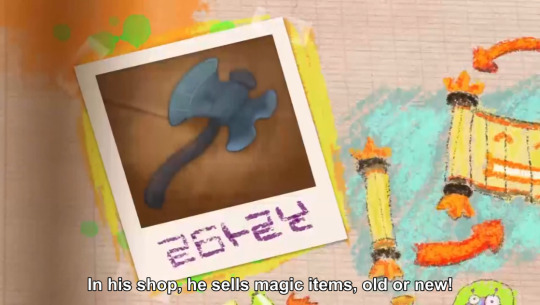
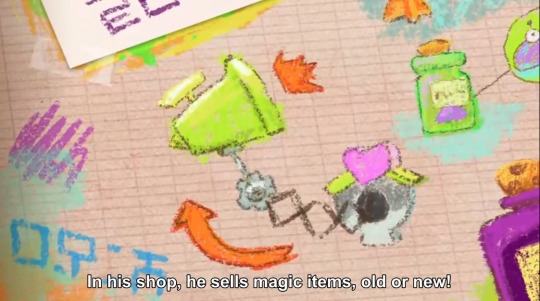
"HACHE" (axe) and "BONG" (??????????????????????????????????...probably onomatopoeia for the sound that contraption he drew makes.
Doesn't make Joris writing "bong" any less funny.)

A literal bear has entered a literal china shop. Warning, warning!


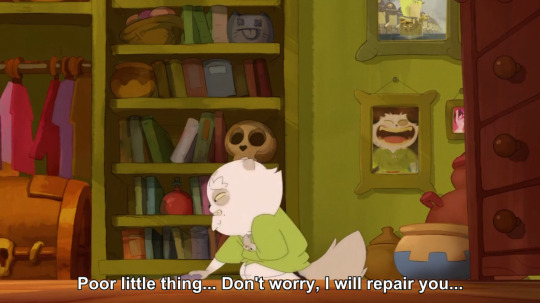
To my memory, this is one of the two times old Kerubim cries during the series, the first time being when he thinks Joris will be stuck for the rest of his life in the Heads for No Tails restraint.
I think he should be legally allowed to kill that pandawa guy.

I do think he loves them, but also, something tells me, a vase that took 20 years to make probably costs an amount of money that I don't even want to fucking imagine.

"VIEUX VASE" (old vase)
WHEN WILL JORIS'S REIGN OF EVIL END? Did he steal that piece?!
Though, it seems that even without it, the vase was still restored, — because, judging from all the cracks on it, the photo was taken after The Incident. I guess this story has a happy ending, despite the missing piece.

Photo of the clock: "REVEIL" (alarm, waking up)
Bottle 1: "ELIXIR"
Bottle 2: "BONBON" (candy)
Bottle 3: "MIEL" (honey)
(the clock itself reads "5AM". Maybe Kerubim's alarm. I doubt he makes Joris, who isn't in education, wake up so early. Or maybe Joris wakes up at 5AM and then goes back to sleep. That would be the funnier possibility.)

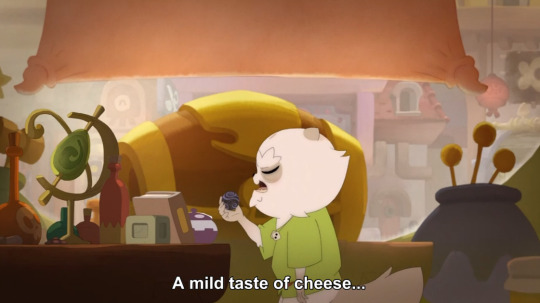
This action will have consequences.

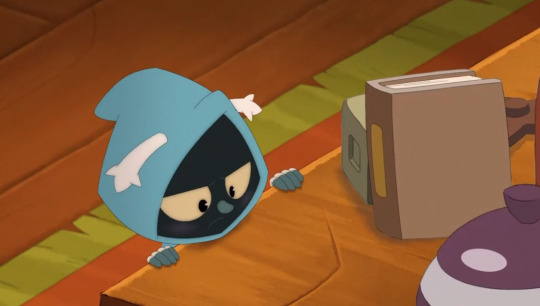
DO YOU SEE WHAT I TOLD YOU ABOUT JORIS AND HIS NEED FOR ROUTINES AND HATING BEING TOLD TO GO TO SLEEP?
It's obvious that Kerubim is just trying to get him to stop asking, Joris knows that, — and it's generally always why he's being asked to go to sleep early.

The text says: "PIERRE MAGI(Q)UE" (magic stone), with "Q" (::) being accidentally replaced by "N" (:)
Joris's guesses for this thing are: "Is this a ball?", "Is this a thing to do sport with to get muscles?", "Is this a geode?" and "Is this an egg?"
Truly, he is a dedicated thinker.

"VIDE GRENIER" (attic sale)
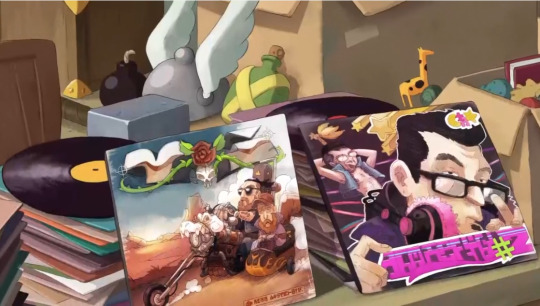
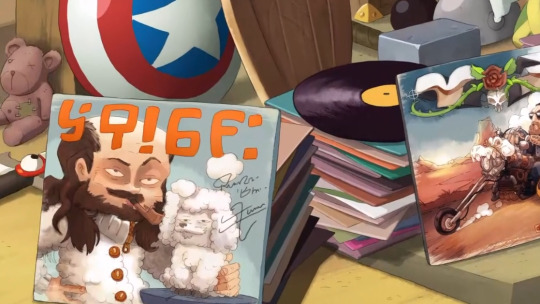
The first two vinyls say "GUST PRODUCTION" and "SADGUIRAM#2" respectively, while the third one says "ROMAIN".
The existence of vinyls also implies the existence of bands and their fans. We already know that, and all, but this still means a lot.

I wonder if slavery has always been a thing in the World of Twelve, or if it came back in style after centuries of being out of style only in Waven. Love their nonchalant response to it, too.
Chances are, this is just normal.
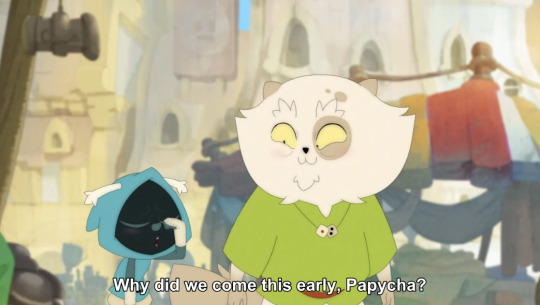
SEE WHAT I MEAN WHEN I TELL YOU JORIS IS A NIGHT OWL? He is NOT good at being awake early.
I also am beginning to suspect Kerubim is a morning person, unlike Joris. hdfkghsdgf.


Kerubim makes buying things a sort of a game for them to play together, to educate Joris on how to be a salesman in the future and continue their family business, but in the process pretty much hugs him and also look at Joris's face and then hand on shoulder car door man hook car and and um and [CAR CRASH] [GLASS SHATTERING] ‘GOOD LORD!’ [GENERAL COMMOTION] [BABY CRYING] ‘WAAAAH WAAAAH’ [YELLING] [POLICE SIRENS] WEEWOO WEEWOO [HELICOPTERS] ‘WE’RE REPORTING LIVE-‘ [EXPLOSION] ‘MY LEG… MY LEG…’
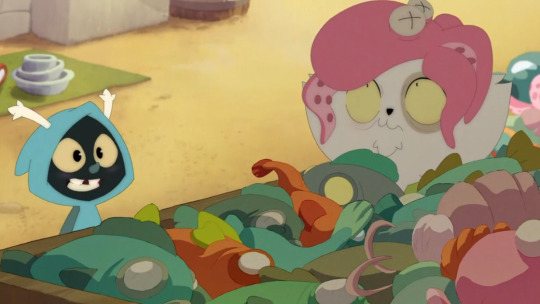
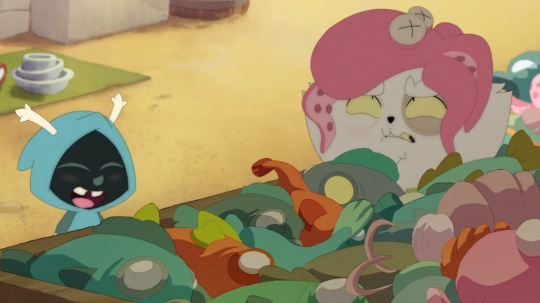

Yeah I'm okay./ (starts foaming.)


"LUIS"
Joris... I have some amazing news from the future. You'll never guess.

At heart, Kerubim is an optimist, and Joris is a pessimist, and they've always been that way, even as kids. I think it's cute that they both have these contrasting characteristics, and that they've had them their whole lives.
It makes them both really like each other, — but also, probably makes them annoy each other to death, across the 600 years of coexistence.

15 notes
·
View notes
Text
Camille

Mes grands-parents avaient acheté une résidence de vacances du côté de Vannes. Pour la crémaillère, ils avaient invité toute la famille à passer quelques jours. Je devais avoir cinq ans et découvris des cousins que je ne connaissais pas. En fait, il s’agissait surtout des enfants des cousins de ma mère.
Lorsque nous arrivâmes devant la maison, nous vîmes un terrain immense sur lequel se promenaient de nombreuses personnes. On était plus proche du repas de mariage que d’un simple weekend à la campagne. Avec ma sœur, nous nous retrouvâmes au milieu d’une farandole de personnes que nous ne connaissions pas. J’eus le droit à des surprises, des bonjours d’étonnements, des bisous baveux de vieux adultes, des « mais qu’est-ce qu’il a grandi, il n’était pas plus haut que trois pommes la dernière fois qu’on l’a vu ! ». Bref, je n’étais pas à mon aise. Alors, je m’éloignais et pendant que ma sœur était prise en charge par mes cousines, je regardais les cousins jouer ou discuter. Tous étaient plus vieux que moi d’au moins cinq ans. Comme je me sentis exclu, je visitais ce grand terrain. Il y avait des fleurs alignées en cercle ou en carré, des tulipes, des hortensias, des roses et j’en passe. Il y avait des arbres mais aucune branche ne me permettait de grimper dessus. Je marchai lentement sans savoir quoi faire. Je voyais toujours les adultes discuter et les entendais rire. En fait, j’étais le seul à ne pas être réellement ravi d’être en cet endroit.
Avant de faire demi-tour, je vis une petite fille. En apparence, elle était plus vieille de deux ans, peut-être trois. Ses longs cheveux blonds semblaient briller avec un reflet de soleil. Elle lisait assise au milieu d’un cercle de livres ouverts. Elle me sourit avant de dire bonjour. Dès lors, j’approchais tout en rendant son sourire.
Comment t-appelles-tu ? demanda-t-elle.
Alexandre.
Enchantée, moi c’est Camille. Que fais-tu ici ? Tu n’es pas avec les autres en train de jouer ?
Non.
J’étais timide. Même avec une cousine, je restais timide. J’observais les livres. Ils n’avaient aucune image, ne comportant que des textes. J’approchai la tête pour les regarder de plus près lorsqu’elle demanda :
Sais-tu lire ?
Je hochai négativement de la tête. Dès lors, elle me proposa d’approcher et de jouer à la maitresse d’école. Je m’assis à côté d’elle et l’écoutais attentivement cherchant à comprendre le sens des lettres, les mots qu’elle prononçait. Ce n’était pas un exercice facile car je n’arrivai pas à lire parfaitement les lignes qu’elle montrait du doigt. Toutefois, je réussis à retenir quelques mots.
La matinée se passait à écouter Camille faire sa leçon de lecture. Soudain, un appel annonça le repas du midi. Je me levai immédiatement et rejoignis la famille sans m’occuper de Camille. Je n’entendis pas cette dernière courir avec moi. A l’instar des repas de famille, celui-ci fut long et pénible. Je regardai les plats se suivre, j’attendais le suivant. Je restais à la table des enfants écoutant les grands cousins déblatérer des idioties pour se la péter, et les cousines dont les plus petites somnolaient à moitié. Après avoir fait tour visuel du groupe, je ne remarquais pas Camille. Je demandai à Carole, ma cousine la plus proche si elle savait où elle se trouvait. Mais, Carole ne put répondre car elle ne la connaissait pas. Cependant, en sortant de table, elle m’aida à chercher Camille, en vain. Elle questionna les adultes.
Camille ? Chérie, on a une Camille parmi nos petits-enfants ? interrogea mon grand-père.
Non, répondit ma grand-mère. Et dans les petits-neveux non plus.
J’expliquai où je l’avais rencontrée. Ma grand-mère caressa mes cheveux recoiffant la raie au passage. Puis, elle expliqua que des enfants du hameau venaient parfois dans le bois car il n’était pas clôturé. Déçu, je passai le reste du weekend à m’ennuyer.
Durant les vacances suivantes, je revis Camille. Elle était au même endroit à lire. Elle n’avait pas changé et portait une couronne de fleurs sur la tête. Elle me reconnut, me sourit et proposa de me faire une leçon de lecture. Je l’écoutai lire un passage des trois mousquetaires d’Alexandre Dumas. Je ne comprenais rien mais restais captivé par sa façon de parler. Je sentais une douceur enivrante m’envahir, je sentais des papillons chatouiller mon ventre. Il faisait beau et j’étais heureux de la revoir, heureux qu’elle ne m’oublie pas. Je montrais mes prouesses en lecture et regrettais de ne pas avoir de crayon pour montrer que je savais aussi écrire.
Je passais l’après-midi avec Camille, oubliant ma famille, mes parents qui partageaient leur temps avec mes grands-parents. J’oubliais ma sœur qui préférait jouer à la poupée sur la terrasse. Quand ma mère m’appela pour le goûter, je proposai à Camille de venir. Elle refusa préférant se nourrir de connaissances. Je partis lui promettant de revenir avec un morceau de chocolat dans du pain. A mon retour, Camille et ses livres avaient disparu.
Toutefois, elle était présente le lendemain puis le surlendemain. Nous jouions à lire et à écrire car cette fois-ci, j’avais pris du papier. Elle lisait énormément et j’écoutais. Parfois, elle me faisait lire corrigeant quelques mots ou la ponctuation. Elle avait pris une pièce de théâtre. Je ne comprenais rien mais c’était drôle de lire chacun son tour. On se donnait des personnages. Parfois, elle prenait une grosse voix pour parler à la place d’un homme. Le soir, je repartais rejoindre la famille.
Par la suite, je la questionnai sur ses parents, où elle habitait exactement. Elle restait évasive me signalant que sa demeure était complètement noire et humide. Son père était ingénieur. Quant à sa mère, elle ne travaillait pas. Pourtant, elle aurait dû être médecin.
Il y eu une nuit étrange. Je dormais dans la même chambre que ma sœur. Nous avions chacun notre lit. Je fus réveillé par un son bizarre. Je compris qu’il s’agissait du grincement de la porte, à cause d’un courant d’air. Le drap de mon lit se leva et ma sœur s’allongea à côté de moi. Cela arrivait qu’elle fasse des cauchemars. Alors, elle préférait me rejoindre plutôt que de rester seule dans son lit. Enfin, je crus que c’était ma sœur parce que cette nuit, je reconnus le visage de Camille. Elle parla doucement.
Ça ne te dérange pas que je dorme avec toi ? J’ai froid et j’ai peur. Il fait tout noir.
Je laissai mon amie se blottir contre moi. Son corps, ses mains étaient gelées. Je ne l’interrogeais pas sur sa présence dans la maison. Nous dormîmes. Au matin, elle avait disparu. Je me levai seul. Ma sœur était déjà debout. Je descendis à la cuisine et demandai si quelqu’un avait vu Camille partir. On me dévisagea. Mes parents pensèrent que j’avais une copine invisible. Je compris que j’avais rêvé.
Durant l’après-midi, lorsque je revis Camille, toujours au même endroit, je parlais de ce rêve. Elle sourit et baissa la tête. Elle choisit un livre : Alice au pays des merveilles. Dès lors, je restai obnubilé par cette histoire fantastique. J’écoutais la petite fille lire avec passion. Et pour la première fois, je comprenais l’humour dans un récit.
Camille n’était pas là pendant les vacances suivantes. J’avais sept ans. Je passais souvent dans le bois au fond du jardin en espérant la voir, mais je ne voyais que de l’herbe et des arbres. De temps en temps, je m’asseyais ou m’endormais en attendant son retour. Elle n’est jamais revenue. Les années passèrent sans que je n’oublie la petite fille rencontrée au fond du jardin de mes grands-parents. Ce même jardin rétrécissait en vieillissant. Le bois ne semblait pas si grand. Mais le regard de l’adolescent n’est pas celui de l’enfant. De temps en temps, je retournais dans cette petite forêt à me souvenir que j’y avais vécu de très beaux moments. J’imaginai un livre oublié posé sur l’herbe par Camille. Cependant, il n’en fut rien.
Cela faisait vingt ans que je n’avais plus entendu parler de Camille. J’écoutais un documentaire télé sur des enquêtes non résolus. Quelle fut ma surprise que de voir le portrait de Camille entre celui de ses parents. Sa famille était portée disparue dix ans avant notre rencontre. Aussitôt, je suivais l’affaire avec attention. La famille de Camille passait des vacances dans le même hameau où se trouvait la maison secondaire de mes grands-parents. Il y avait bien quelques suspects, seulement personne n’avoua quoi que ce soit. Après une nuit de réflexion à chercher à comprendre pourquoi je l’avais rencontrée, pourquoi je lui avais parlé et pourquoi, elle n’avait pas changé, c‘était surtout ce lieu noir, humide et froid qui m’intriguait. J’appelai dès le matin mon grand-père. Nous discutâmes de cette affaire.
Au fait Papy, tu as déjà pensé à faire sonder le jardin ?
Pourquoi faire ? répondit-il avec une voix étonnée.
C’est presqu’une ferme. Et je me disais qu’il devait peut-être y avoir un puits caché ou quelque-chose comme ça. Une cave ?
Tu sais que ça pourrait être une bonne idée. Un puits m’aiderait pour arroser les fleurs.
Deux mois plus tard, ma mère appela. Elle m’annonça qu’on avait trouvé des corps dans un puits fermé chez ses parents. La maison faisait la une des journaux télé. Effectivement, je reconnus la maison. De nombreux gendarmes encerclaient la demeure. Néanmoins, on pouvait remarquer un groupe de personnes en combinaison blanche en train de marcher vers un trou entre les arbres. Et le lieu du trou était la position exacte où Camille lisait.
Quelque-jours plus tard, je passais voir mes grands-parents. Ils racontèrent la découverte du puits et celle de Camille et de ses parents. Mon patriarche gardait le journal qui expliquait les causes de la mort. Ils avaient été exécutés d’une balle en pleine tête. L’enquête aboutit que c’était en pleine nuit et qu’ils dormaient au moment des faits.
J’accompagnais ensuite mes grands-parents vers le puits. Nous regardâmes pendant un long silence ce trou ouvert. L’atmosphère était remplie à la fois d’émotion et de libération. Un vent frôla mon visage. Je levai les yeux et crus apercevoir la silhouette d’une petite fille qui s’effaçait doucement.
C’était juste bouché par une dalle en béton et recouvert d’un tapis de verdure, annonça papy. Le puits ne contient plus d’eau.
C’est grâce à ça que les ouvriers ont vu les ossements, ajouta mamy.
Mon grand-père me regarda avec son air perplexe. Il posa sa main sur mon épaule puis hocha la tête en souriant.
Je me souviens que c’était à cet endroit que tu jouais tout seul quand vous veniez. Tu prenais toujours du papier et des crayons et tu jouais ici…Elle s’appelait comment déjà ton amie imaginaire ? Camille ?
Je répondis d’un geste de la tête.
Comme la petite qui était dans le trou, murmura-t-il.
Il ne posa pas d’autres questions. Nous rentrâmes et je passais la nuit chez eux.
Lorsque ma première fille est née, nous l’avons appelée Camille par hommage. Et elle a adoré apprendre à lire.
Alex@r60 – août 2023
41 notes
·
View notes
Text
Okay so looking at the word frequency list for Les Miserables available on intratext dot com, here are some words that stood out to me (although everyone could look at this list and would find something different and interesting):
9589 il (he)
2556 elle (she)
2089 je (I)
1182 homme (man)
906 Marius (more than any other character but to be fair, other characters are frequently referred to by aliases)
727 Jean
685 Cosette
680 Valjean (There are 47 more Jeans than Valjeans!)
520 Père (Father, or in some cases, something like "old man")
508 Thénardier
454 Enfant (child) (plus there's 193 uses of children)
384 yeux (eyes) (157 instances of eye singluar)
364 femme (woman, wife)
349 mère (mother)
346 main (hand)
340 voix (voice)
338 dieu (god)
337 vieux (old, masc.) (194 old, fem.)
334 Paris
321 Hugo (actually this is a huge outlier. Hugo doesn't appear many times in the text at all, but it's in a lot of footnotes and the footnotes also get counted)
315 Javert
313 évêque (bishop)
283 Gavroche
270 maison (house)
267 Madeleine
251 mort (dead)
227 jardin (garden)
226 Fauchelevent
224 ombre (shadow)
221 Fantine
189 coeur (heart)
184 matin (morning)
176 lumière (light)
170 amour (love)
161 Courfeyrac
157 France
153 Napoléon
144 Révolution
133 Enjolras
129 eh
117 waterloo
116 barricade
83 dents (teeth)
81 Eponine (I was surprised there was more Courfeyrac and Montparnasse than Eponine!)
79 Grantaire
79 terrible (This is about where I got bored of scrolling but there were a couple words that I think of as quintessential Hugo that I had to look up also)
46 lugubre (lugubrious)
24 sépulcre (sepulchre)
20 lugubres (lugubrious make it plural)
19 spectre (Dumas complained that Hugo used "spectral" every ten pages, although spectral actually only appears twice but I see his point)
13 spectres
7 lugubrement (lugubriously)
4 sépulcral (sepulchral, plus three more instances but feminine)
3 spectrale
2 spectral
32 notes
·
View notes
Text
Very Vague Analysis of "Javert t'es amoureux" interpreted by Jean Vallée
I wrote a shitpost about it some days ago and @aftershocked 's comment made me want to develop on it, about why the lyrics are supposed to convey a metatextual message about the actor playing Javert (here, Jean Vallée). + Thoughts on why I think it's incredibly funny that they chose to make Javert a hopeless romantic and we all went 'ah! he is gay!' (as we should). I apologize if I'm just stating the obvious btw I'm not the smartest person in the room. Also, I read this before and I thought it was a good translation and I will use some of their previous interpretation, so credits to: https://www.kellycatalfamo.com/blog/2017/9/3/javert-tes-amoureux (thank you again, aftershocked, because i never saw this post before you mentioned it!).
1 — Javert is Jean Vallée.
No kidding, Jean Vallée is the first one to interpret Javert in Boublil's and Schönberg's musical in 1980. But then it does make sense for Vallée to write a song about himself as Javert, as he is transcended by his love for the character and the role (we'll get back to that).
There is definitely a play with the use of "Je" and "Tu". Who is je in this song? It's not obvious from the start. The first line might suggest the speaker is Javert directly ("Moi, le lecteur invétéré du Code Civil et du Code Pénal") yet this Je is accusing Javert, the Tu, in the chorus, which leave a doubt of the identity of this speaker. (You could definitely argue that it would not be out-of-character for Javert to talk to himself, on the contrary. Lol.)
Moreover, kellycatalfamo mentions that Javert actively reading is ooc, and this is also an element that makes me think that Vallée is mainly the one talking in the song, making the character he's supposed to play doing things he would not do otherwise : "What I took from this is that Vallée is not simply describing Javert reading the advice column in bed -- a VERY non-Javert-like activity -- but describing Javert suddenly realizing this uncharacteristic thing he's doing ... and continuing to do it".
According to me, Jean Vallée is trying to be Javert, to incarnate Javert, but he fails, and loses his balance and skills as he tries to act like the character again (reading the Code Civil, keeping his cool, seeing the world only in black and white, etc.).
2 — Vallée is trying to get back into his role.
So, in kellycatalfamo's translation, the original french lyrics is "redeviens moins si vieux" in the second chorus, but I'm sure it's a mistake and the lyric is actually "redeviens moins sérieux" (= "become less serious again"). Vallée castigates himself because he slipped out of his role, talking to both himself and the Javert he tries to make out of himself (use of the imperative).
"C'est impossible, venez à mon secours et rendez-moi inaccessible" = There is an urgent need to get back into his role, for Vallée, and suddenly, he is not Javert anymore and asks help to the other actors around him. He wants to be unattainable, in the sense Javert is (as a fictional character existing only on paper) but also from his own feelings, attacking him from the outside, the real world (the théâtre being traditionally a closed space, existing on its own and according to its own rules and codes).
"Ce roman policier, cette série noire, qui t'a incarcéré le cœur" = The roman policier in France was mostly invented by Balzac, huge inspiration for Romantics like Hugo, so perhaps it isn't as much of a reach to assume that, here, Vallée is referencing to the novel Les Misérables and the effects it had on his "heart". If we're seeing it like that, then he means that he is submerged, overwhelmed, by his own love for the original material—Javert is thus in love by proxy, through his interpret's own adoration for the text.
"Je veux rentrer dans mon théâtre, continuer d'être misérable par contrat et par devoir" = oooh again, Jean-Pierre Virgil is so smart! At this point, Javert completely disappear behind his interpret. The theater, locus where he, Javert, exists on his own; locus where Vallée, amorous, desperately wants to come back. Moreover, the double sense of this line: Javert continues to be miserable because of his characteristic sense of duty and justice, contracted he is to the law like a dog to its master; but it could also be about Vallée's contract with Hossein, Boublil, Schönberg, as a profesional actor, and the sense of artistic duty he feels to do Javert's character right on the scene. (Again, where does Vallée start, where does Javert finish...)
"Je crois qu'on est hier alors qu'on est déjà ce soir" = The most strange lyric to me so far. I picture Vallée standing on the théâtre's scene, taken aback because he thought he still had time to revise his lines, but he doesn't, because he's already performing and he has to get back in the role. I think this line shows how he is losing his self within the text, whether or not it's the novel or the script, and his love for the role.
"Pardonnez monsieur Victor, si je sors du bouquin, je n'en peux plus, mon amour est trop fort" = Finally, the most obvious lol, I should've start there I'm sorry. It's written on the thin here. Vallée is completely out of his role and expresses his love for the original material to the author—and yet! It could also be Javert himself, coming out the book. In french, "sortir de" can also mean "to slip out of something", metaphorically speaking.
3 — Javert in the Brick.
Finally, to some extent, I think it is also a song about Javert Déraillé. My guess is that Jean-Pierre Virgil and Jean Vallée wanted to make Javert sympathetic to the public, give him some romantic sensibility, and since the musical's motif is a lot centered around love, it makes sense. Although, I don't think they realize the way they portrayed Javert as a homosexual, because, if not Jean Valjean, who else Javert might be in love with LOL. My favorite lyrics that might imply Valvert are "Toi qui ne voulais regarder la télé pas autrement qu'en noir ou blanc, voilà que tu trouves qu'il manque de couleurs" > to me, this is an obvious reference to how Jean Valjean completely destroys Javert's vision of the world. Also, a reference to the french lyrics in Javert's Soliloquy: "noir ou blanc, hors-la-loi ou dedans; noir ou blanc, c'est Javert ou Valjean".
Anyways, I love how Vallée insults Javert in the song, as if aware that being in love is uncharacteristic of him, yet is happening ("pauvre vieux con de flic" and "bravo le clown" never fail to make me laugh. I always call Javert a clown because of this song lol).
Hm. I am enthusiastically open to discussion and I apologize if I wrote a way too long post about something everyone in the fandom already knew about. I just love this song so much.
11 notes
·
View notes
Text
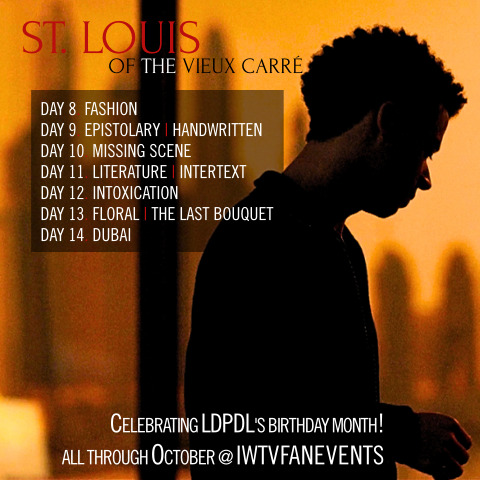
Saint Louis of the Vieux Carré —an LDPDL fan event
It's the second week of October and, through the whole month, we're celebrating AMC IWTV's Louis de Pointe du Lac with a creative challenge!
See the creations other fans have already shared here »
See the prompt list and learn more about this event here »
Remember, these prompts are meant to be interpreted freely, and you don't need to stick strictly to them. These are the ones for the second week, and fanworks inspired by them will be found in the corresponding tag:
day 8. fashion
day 9. epistolary | handwritten
day 10. missing scene
day 11. literature | intertext
day 12. intoxication
day 13. floral | the last bouquet
day 14. dubai
Reblog or repost this text and graphic to spread the love; and don't forget to tag your posts with #IWTVfanevents or tag @iwtvfanevents so we can share them on the blog, and add them to the collection on AO3: Happy birthday LDPDL!
#louis de pointe du lac#interview with the vampire#amc interview with the vampire#AMC IWTV#IWTV AMC#IWTV#st. louis of the vieux carré#IWTVfanevents
47 notes
·
View notes